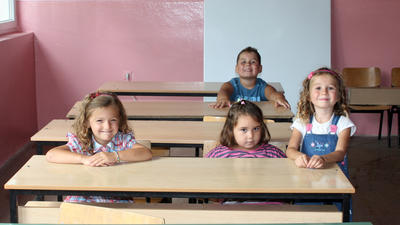-
Our work
-
Fields of work
- Arms control
- Border management
- Combating trafficking in human beings
- Conflict prevention and resolution
- Countering terrorism
- Cyber/ICT Security
- Democratization
- Economic activities
- Education
- Elections
- Environmental activities
- Gender equality
- Good governance
- Human rights
- Media freedom and development
- Migration
- National minority issues
- Policing
- Reform and co-operation in the security sector
- Roma and Sinti
- Rule of law
- Tolerance and non-discrimination
- Youth
- Field operations
- Projects
-
Meetings and conferences
- Summit meetings
- Review Conferences
- Ministerial Council meetings
- Plenary meetings of the Permanent Council
- Plenary Meetings of the Forum for Security Co-operation
- Security Review Conferences
- Annual Implementation Assessment Meetings
- Economic and Environmental Forum
- Economic and Environmental Dimension Implementation Meetings
- Human rights meetings
- Media conferences
- Cyber/ICT security conferences
- Conference of the Alliance against Trafficking in Persons
- Gender equality conferences
- Annual OSCE Mediterranean conferences
- Annual OSCE Asian conferences
- Partnerships
-
Fields of work
-
Countries
- All
-
Participating States
- Albania
- Andorra
- Armenia
- Austria
- Azerbaijan
- Belgium
- Belarus
- Bosnia and Herzegovina
- Bulgaria
- Canada
- Croatia
- Cyprus
- Czechia
- Denmark
- Estonia
- Finland
- France
- Georgia
- Germany
- Greece
- Holy See
- Hungary
- Iceland
- Ireland
- Italy
- Kazakhstan
- Kyrgyzstan
- Latvia
- Liechtenstein
- Lithuania
- Luxembourg
- Malta
- Moldova
- Monaco
- Mongolia
- Montenegro
- The Netherlands
- North Macedonia
- Norway
- Poland
- Portugal
- Romania
- Russian Federation
- San Marino
- Serbia
- Slovakia
- Slovenia
- Spain
- Sweden
- Switzerland – OSCE Chairpersonship 2026
- Tajikistan
- Türkiye
- Turkmenistan
- Ukraine
- United Kingdom
- United States of America
- Uzbekistan
- Asian Partners for Co-operation
- Mediterranean Partners for Co-operation
-
Structures and institutions
- Chairpersonship
-
Secretariat
- Secretary General
- Office of the Secretary General
- Conflict Prevention Centre
- Transnational Threats Department
- Office of the Special Representative and Co-ordinator for Combating Trafficking in Human Beings
- Office of the Co-ordinator of OSCE Economic and Environmental Activities
- Gender Issues Programme
- Opportunities for Youth
- Department of Human Resources
- Department of Management and Finance
- Office of Internal Oversight
- Documentation Centre in Prague
- Institutions
-
Field operations
- Presence in Albania
- Centre in Ashgabat
- Programme Office in Astana
- Programme Office in Bishkek
- Mission to Bosnia and Herzegovina
- Programme Office in Dushanbe
- Mission in Kosovo
- Mission to Moldova
- Mission to Montenegro
- Mission to Serbia
- Mission to Skopje
- Project Co-ordinator in Uzbekistan
- Closed field activities
- Parliamentary Assembly
- Court of Conciliation and Arbitration
- Organizational structure
- About us
Press release
On International Day of Peace, OSCE Chair says education vital for reducing tensions, emphasises need to resolve protracted conflicts

- Date:
- Source:
- OSCE Chairpersonship
- Fields of work:
- Conflict prevention and resolution, Education
KYIV, 21 September 2013 – The OSCE Chairperson-in-Office, Ukrainian Foreign Minister Leonid Kozhara marked the International Day of Peace today by stressing the vital role education can play in promoting peace and the urgent need for increased and co-ordinated efforts to peacefully resolve protracted conflicts in the OSCE region.
“The International Day of Peace offers us all an opportunity to reflect on how we can intensify our work to strengthen the ideas of peace both within and among all nations and peoples, and this is especially relevant for the OSCE as the world’s largest regional security organization,” Kozhara said. “Considering that education for peace is the theme of this year’s International Day, I want to stress the critical role education plays in reducing and preventing tensions, building trust, preparing societies for peace and fostering non-violent processes of conflict resolution.”
“Promoting education on human rights and principles of tolerance and non-discrimination is one of key priorities of Ukrainian OSCE Chairmanship in 2013. Education has the power to develop values and attitudes, help children reject prejudices and stereotypes and bridge divides between communities and nations,” Kozhara said. “The OSCE Youth Summit we held this summer at the Artek International Children’s Centre served exactly this purpose – to encourage interaction between young people who will serve as peace constituents in their countries in the future.”
The event was held in Crimea, Ukraine, in July-August; it brought together more than 500 children from 60 countries to discuss how they can contribute to tolerance and non-discrimination, as well as to conflict prevention and resolution and peaceful development.
“International Peace Day also offers a unique opportunity for a cessation of violence and hostilities throughout the world,” Kozhara said. “Protracted conflicts in the OSCE region remain one of the main sources of tension and a threat to security and stability in the OSCE area. Efforts must be redoubled to build much-needed political will and to help the parties find lasting peaceful solutions.”
“Tested and proven instruments the OSCE has in stock, such as dialogue facilitation, mediation, preventive diplomacy and non-military confidence-building measures, as well as capacity- and peace-building activities must be used in conjunction with meeting the immediate needs of people in conflict-affected territories. This would help create an atmosphere of trust and confidence between people, communities and nations, and pave the way for sustainable resolution of conflicts,” Kozhara said.